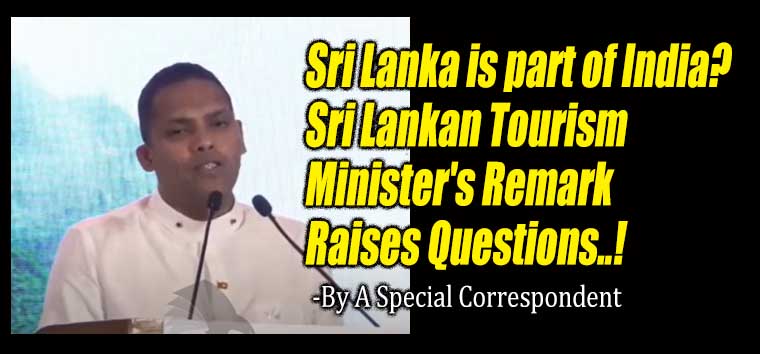-By A Special Correspondent

(Lanka-e-News -13.Feb.2024, 10.45 PM)
India and Sri Lanka have shared a long and intricate history, marked by moments of friendship and instances of tension. Despite being neighboring nations, the relationship between the two countries has not always been smooth sailing. The recent remark by a Sri Lankan Cabinet minister suggesting that Sri Lanka is part of India has once again brought to light the complexities in their ties.
The historical ties between India and Sri Lanka run deep. The Sinhalese people, the majority ethnic group in Sri Lanka, trace their origins back to North India. Migration from India, particularly during ancient times, significantly influenced the cultural and ethnic makeup of Sri Lanka. Additionally, the introduction of Buddhism to Sri Lanka during the 3rd century BCE further strengthened the cultural and religious connections between the two countries.
The struggle for independence in Sri Lanka was not isolated from the broader movements for freedom in the region. Influenced by Mahatma Gandhi's philosophy of nonviolence, Sri Lankan leaders such as Anagarika Dharmapala rallied for independence from colonial rule. The principles of nonviolence espoused by Gandhi inspired similar movements in Sri Lanka, underscoring the shared aspirations for sovereignty and self-determination.
Both India and Sri Lanka played crucial roles in the Non-Aligned Movement during the Cold War era. However, shifts in foreign policy priorities, particularly after 1977, led to divergences between the two nations. Sri Lanka's pivot towards the United States strained its relationship with India, prompting Indian interventions in Sri Lanka's internal affairs, such as the support for Tamil separatist movements.
India's involvement in supporting Tamil rebel groups during the Sri Lankan Civil War remains a contentious issue. From the 1980s to the late 1990s, India provided arms, training, and financial assistance to various Tamil insurgent groups, including the infamous Liberation Tigers of Tamil Eelam (LTTE). This support further complicated the relationship between India and Sri Lanka, leading to significant geopolitical ramifications.
The Indian Peace Keeping Force (IPKF) intervention in Sri Lanka in 1987, ostensibly to mediate the conflict between the Sri Lankan government and Tamil insurgents, stirred controversy. India's decision to drop food and medical supplies into Tamil-held areas, coupled with accusations of supplying weapons to rebel groups, heightened tensions between the two nations. The Indo-Sri Lanka Peace Accord, though signed with good intentions, failed to bring lasting peace to the region.
The tragic assassination of former Indian Prime Minister Rajiv Gandhi by a member of the Tamil Tigers in 1991 further strained relations between India and Sri Lanka. The incident underscored the threat posed by militant groups operating in the region and highlighted the challenges of managing cross-border terrorism.
Despite past tensions, India played a crucial role in assisting Sri Lanka in defeating the Tamil Tigers in 2009. The close cooperation between the two countries during the final stages of the civil war demonstrated the potential for collaboration in addressing shared security concerns.
The expulsion of the Colombo station chief of India's intelligence agency in 2015, amid accusations of meddling in Sri Lanka's presidential election, added another layer of complexity to bilateral relations. Such incidents have fueled perceptions of Indian interference in Sri Lanka's internal affairs, raising questions about sovereignty and independence.
The Easter Sunday bombings in 2019, carried out by local extremists with alleged links to international terrorist networks, including India's Research and Analysis Wing (RAW), further strained relations between the two countries. Accusations of RAW's involvement in the attacks underscored the delicate nature of intelligence-sharing and counterterrorism cooperation.
Recent allegations of international conspiracies aimed at destabilizing Sri Lanka, including purported involvement by Indian and American intelligence agencies, have added fuel to the fire. The role of foreign actors in Sri Lanka's internal affairs has been a subject of intense debate, with some alleging interference in the country's political and social dynamics.
The remark by a Sri Lankan Tourism Minister suggesting that Sri Lanka is part of India has sparked concerns about the erosion of Sri Lanka's sovereignty. While historical, cultural, and geographical ties between the two nations are undeniable, asserting Sri Lanka's independent identity is crucial in safeguarding its sovereignty and national interests.
In conclusion, while India and Sri Lanka share deep-rooted historical, cultural, and economic connections, asserting Sri Lanka's sovereignty and independence is paramount. The recent remark by a Sri Lankan Cabinet minister underscores the need for careful navigation of bilateral relations, respecting each other's sovereignty, and fostering cooperation based on mutual respect and understanding.
Sri Lankan Tourism Minister's video footage as follows
---------------------------
by (2024-02-13 17:18:41)
Leave a Reply